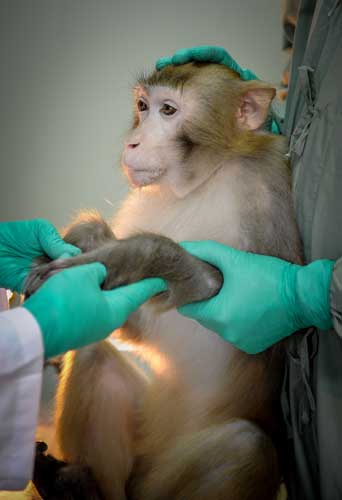 |
|
A monkey is used to test a vaccine for HIV/AIDS at the Guangzhou Institutes of Biomedicine and Health. PHOTOS BY FENG YONGBIN / CHINA DAILY AND LIU DAWEI / XINHUA |
Qu Ping, deputy director of animal research at the institute, said about 40,000 mice, of more than 400 breeds, are raised every year for research into fields such as hepatitis B and lung cancer. They drink bacteria-free water and their food is produced especially for them, she said, adding that the institute has installed larger cages to ensure that each mouse has more room.
Jing Haijiang, who raises mice at the institute, said some are imported from, or donated by, other countries, such as the United States, while others are purchased from accredited breeding companies.
"The price of the mice varies greatly depending on their strain," he said. "Some, with rare characteristics, can cost as much as 200,000 yuan ($30,000) each."
Qu said that when an experiment is completed, all the animals are humanely destroyed. For example, mice are anaesthetized before being painlessly killed with carbon dioxide. Their bodies are stored in a large fridge before being transported and disposed of by certified companies, she said.
Huang, director of the Biological Resource Center, said the animals deserve respect. "We should treat laboratory animals well because they are being sacrificed for the well-being of human beings."
Sun, from CALAS, said animal protection is closely linked to a nation's general development and the education of its people. Simply relying on laws and regulations will not be enough to ensure the welfare of laboratory animals.
"They are totally defenseless in front of man," he said. "However, a normal person with a shred of decency would never abuse them."
'We have a responsibility to be kind'
In a serene garden on the outskirts of Shanghai, stands a special memorial that bears a plaque in both Chinese and English that reads: "Dedicated to the memory of the laboratory animals that devoted themselves to biomedical science".
Although tributes of this sort have become the norm in many other parts of the world, this memorial was the first of its kind in China. It was erected in 2002, when the Shanghai Laboratory Animals Center, a branch of the Shanghai Institutes for Biological Sciences at the Chinese Academy of Sciences, moved to its current site in the municipality's suburban Songjiang district. When it was founded in 1982, the original center, in the city's downtown area, was one of the first three laboratory animal centers in the country.
Monuments have now been erected at universities and institutes where animals are used in laboratory research, including Yangzhou University in Jiangsu province, Northwest University in Shaanxi province and Shenyang Medical College in Liaoning province.
Liao Kan, assistant to the director of the Shanghai Institutes for Biological Sciences, said laboratory animals act as a crucial base for research and development in the fields of bioscience and medicine. They are a bridge between theory and clinical experience.
"They exchange their lives for the development of human health, and in return we respect and commemorate their lives," he said.
On Tomb-sweeping Day, a traditional annual Chinese festival when people visit the graves of their ancestors to pay their respects, it is common to see laboratory staff at the center spontaneously lay bunches of flowers in front of the animals' memorial.
"Every member of staff has received training regarding the ethical treatment of laboratory animals. Everybody is clear that, as scientists, we have a responsibility to be kind to these animals," Liao said.
